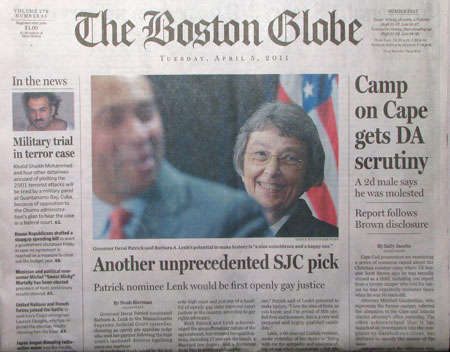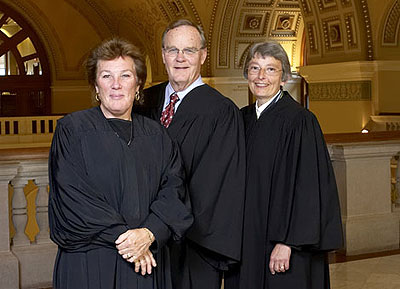 |
 |
Pro-family activism that makes a difference! | ||||
Governor's lesbian nominee to Massachusetts Supreme Judicial Court comes with disturbing baggagePublic hearing Wednesday at State HousePOSTED: April 22, 2011 Massachusetts governor Deval Patrick has nominated a well-known lesbian judge, Barbara Lenk, to the Supreme Judicial Court. Lenk is currently an appellate court judge. She was appointed to the Superior Court by Bill Weld in 1993 and elevated to the appellate court by Weld in 1995. This also appears to be part of a recent national push to appoint openly homosexual judges. Lenk's confirmation hearing before the Governor's Council will be next Wednesday, April 27 at the State House.
The nomination has been celebrated by the liberal establishment as well as the homosexual movement in Massachusetts. But Lenk's activities -- as a self-identified lesbian, "married" to another woman, with two children, who clearly supports the homosexual movement (as well as other baggage) -- have frightened and outraged conservatives. 1. Support for homosexual-themed anti-Semitic school playLenk's apparent support for a disgusting homosexual-themed anti-Semitic play presented in Concord has caused big concern. The play, "Falsettos," is a truly sickening piece of work. It is a homosexual love story and obscenely mocks Jewish ethnicity and denigrates traditional Judaism, presented in a crude and vulgar manner. The play also encourages promiscuous homosexual sex. (Read more HERE.) It is currently the object of a town resolution condemning the play to be voted on next week. Barbara Lenk is on the Board of Directors of Kerem Shalom, a far-left, non-affiliated, pro-gay "welcoming" Jewish temple in Concord. On March 29 a letter was published in the local newspaper by the president of Kerem Shalom, on behalf of the temple. In the letter, Temple Kerem Shalom enthusiastically endorsed "Falsettos" and described the Orthodox Jewish group that opposed the play as out of the mainstream. As a Board member (and as a public figure) one must assume Lenk agrees with that. She has not said anything to the contrary. 2. Lenk's extremist decision in 1998 Boston domestic partnership case was overruled by Margaret MarshallIn 1998 homosexual activists tried to push domestic partnership legislation through the Massachusetts Legislature. But Gov. Paul Cellucci and Speaker Tom Finneran blocked it. So they tried a different approach. On Aug. 4, 1998, Boston Mayor Menino issued an executive order to create legal domestic partnerships for municipal employees in Boston. On November 10 challenged in court by the Catholic Action League, headed by C.J. Doyle, and the American Center for Law and Justice (ACLJ). In December 11, 1998, the Superior Court agreed with the plaintiffs that the executive order was illegal and issued an injunction to stop it. The homosexual lobby appealed it, apparently having gone "judge shopping" for the right venue. On December 21, 1998, a single justice on the Appeals Court -- Barbara Lenk -- lifted the injunction, ruling that by not allowing domestic partnerships it would cause "irreparable harm" to the couples' ability to get health insurance. The case then went to the Supreme Judicial Court. On July 8, 1999, the court unanimously overruled Lenk's ruling, and ruled that the executive order was illegal. The decision, written by Margaret Marshall, stated that cities and towns could not re-define the family for group insurance purposes -- only the Legislature could do that. (Obviously, Marshall modified her views on that afterwards!) Is this the kind of "justice" we want on the Supreme Judicial Court? 2. Profiled in homosexual magazine as "openly lesbian judge"Lenk has not been shy about her "identity" as a lesbian. In November, 2008 the homosexual magazine Spirit published a profile of homosexual judges in Massachusetts, highlighting in particular Lenk and two others.
The article observed the "openly gay and lesbian judges" have helped make the court system "a much friendlier place for LGBT people." It also quoted the legal director of GLAAD, a homosexual (and publicly funded) legal group: "We need out LGBT judge role models as emblems for our kids." "Out gay and lesbian judges, just by their presence on the bench, create a shift in the culture," says Katherine Triantafillou, a founder and former co-chairwoman of the Massachusetts Lesbian & Gay Bar Association (MLGBA), in the article If confirmed, Lenk's status as a "married" lesbian with children will likely be used in the public schools to reinforce the normalcy and legality of "gay marriage." 3. Lenk's legal philosophy: Interpretation of the law "evolves"Lenk told Spirit magazine that in her opinion . . . "The law evolves and develops. It is not carved in granite. Judges do not enact laws, but it is our job to interpret and apply them in specific circumstances. Those circumstances change over time, and that has to affect how the law is understood and applied. . . . Members of minority groups [i.e. homosexuals] may see certain things differently based on their own experiences." So much for the concept of original intent. It's now whatever the judge feels like. National push for 'gay judges'The rush to have homosexuals as federal and state judges is on. It's as if both Obama and Gov. Patrick feel they have a window of time to do the most they can. As we have seen already, this is a powerful way of changing society by bypassing the Legislature and any vote of the people.
All of these have been celebrated by the homosexual press. There are many more lower-profile nominations, also. And there will be more. Also on Wednesday, April 6, U.S. District Court Judge Vaughn Walker, who last August declared California's same-sex marriage ban to be unconstitutional, acknowledged to reporters that he is homosexual -- which was generally assumed. Affirmative action nomination in Mass. Gov. Deval Patrick made it clear that this is an affirmative-action appointment. He told the Boston Globe he considered this SJC nomination "groundbreaking" and that "I love the idea of firsts, as you know, and I'm proud of this one." Besides Lenk, Patrick has appointed two high-profile lesbians to lower judgeships since he became Governor:
Generally undistinguished record - and reaction from Governor's CouncilBeside what's outlined above (unsurprisingly, ignored by the Boston media), a cursory look at Lenk's record on the Appellate Court shows her to be generally undistinguished, though very liberal. The Governor's Council must approve the nomination, and this has caused some reaction from at least two of the Governor's Council members. As the State House News reported: For most councilors who will vote on Judge Barbara Lenk's nomination to the Supreme Judicial Court, Gov. Deval Patrick's fourth nominee to the highest court comes as a "blank slate." Hearing before Governor's Council next Wednesday, April 27 at 10 amThe hearing for Barbara Lenk will be before the Governor's Council, in the Governor's Office suite of the State House, on Wednesday, April 27, at 10 am. The public can come and testify.
The bottom line: We believe that if Barbara Lenk is confirmed, this could be the final nail in the coffin for real justice in Massachusetts. |
| Top |

